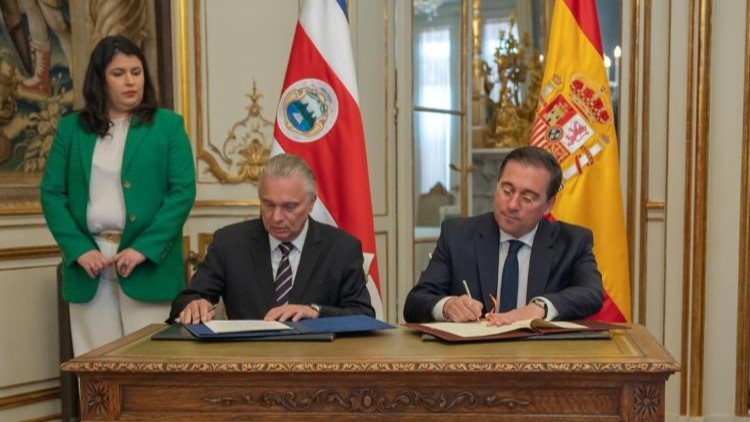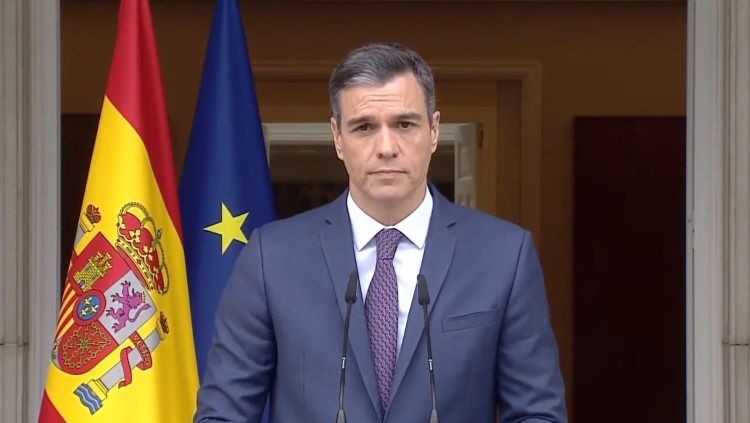Eduardo González
The Minister of Foreign Affairs, José Manuel Albares, received yesterday in Madrid his counterpart from Costa Rica, Arnoldo André Tinoco, with whom he signed an agreement for the promotion of Spanish in the diplomatic field and international organizations.
Albares had a lunch and a meeting with André at the ministerial headquarters of the Viana Palace, according to the Ministry of Foreign Affairs in a press release. During the meeting, the two ministers signed a Memorandum of Understanding on the international promotion of the Spanish language in the diplomatic field and in international organizations.
The agreement, according to the Department of Albares, vindicates “the global language character of Spanish, which is the second native language by number of speakers in the world and the official language of the United Nations.” Under the agreement, the two countries undertake to promote the presence and recognition of the Spanish language in diplomacy and international organizations, especially in the United Nations system, as well as in the legal sector and international arbitration.
The Memorandum of Understanding also highlights the commitment of Ibero-American countries to International Law and the peaceful resolution of disputes, and especially to international legal cooperation.
This is the third bilateral agreement for this purpose in the last month and a half, after those signed on March 6 with the Foreign Minister of Panama, Janaina Tewaney, and on April 15 with the Minister of Foreign Affairs of El Salvador, Alexandra Hill Tinoco.
On the other hand, Albares and André Tinoco reviewed the bilateral, regional and multilateral agenda, in which they highlighted “the coincidences on the main issues,” and showed their interest in continuing to deepen and expand the “excellent” bilateral relations, “attending to the new common challenges, such as the immigration challenge.”
At the meeting, Minister Albares reiterated to his Costa Rican counterpart the commitment of Spanish cooperation with his country, which this year turns 40, and with the integration process in the Central American region through the Ibero-American Integration System (SICA). , of which Spain is an extra-regional Observer State, “accompanying its socioeconomic and institutional development, especially in these moments of uncertainty that it is going through.”
The Costa Rican Foreign Minister is in Spain as part of a tour of Europe to promote the High Level Conference on Ocean Action that his country will organize on June 7 and 8, as André Tinoco himself explained to The Diplomat during an exclusive interview. in the Casa América library.
During the same interview, the minister highlighted the recent entry into force of the Association Agreement between the EU and Central America (AACUE) and recalled that, with this agreement and with the bilateral investment protection treaties and to avoid double tax taxation, Costa Rica has already completed its “institutional framework” of relations with Spain, “the second foreign investor” in its country. He also assured that, although President Rodrigo Chaves’ agenda “is always very tight”, an upcoming tour of several countries, including Spain, is not excluded.
The minister’s visit to Spain included, on Monday, a lunch with the members of the Alianza por Iberoamérica Business Council (CEAPI), to whom he assured that Costa Rica is a reliable partner, with a solid democratic tradition and recognized legal security and in which You can invest with peace of mind.
André also met that day with the Ibero-American Affairs Commission of Congress and the spokespersons of the parliamentary groups, with the Minister of Inclusion, Social Security and Migration, Elma Saiz, with whom he addressed the immigration challenge facing Costa Rica and Spain, and with the director of the Carolina Foundation, Erika Rodríguez Pinzón.
On Tuesday, the chancellor was received by representatives of the Airbus company, the Ibero-American secretary general (SEGIB), Andrés Allamand, and the director of the Spanish Agency for International Development Cooperation (AECID), Antón Leis, and participated in an event from the Business Institute (IE).







